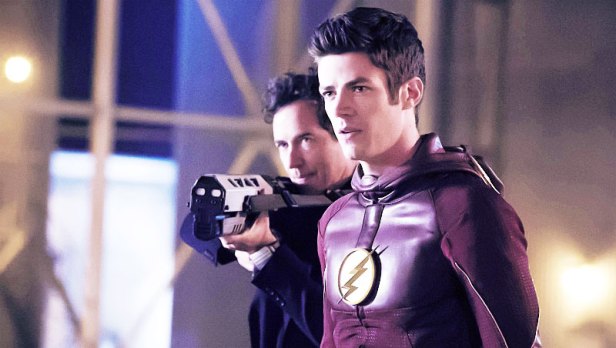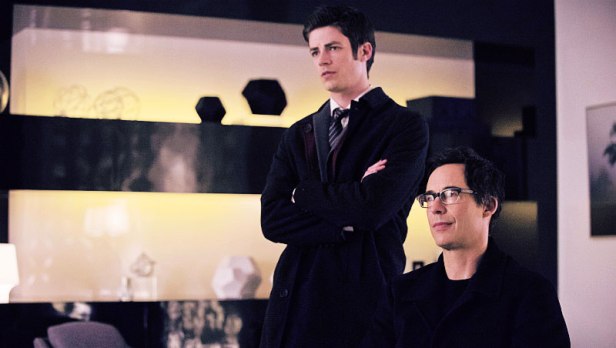
I’ve always found it impossible to watch superhero stories without finding symbolic, mythological archetypes. Heroism vs. evil, overcoming adversity, and a “little” man attaining superhuman abilities and using them toward good ends speaks to audiences on a multitude of levels. It resonates with inner truths, our moral centers, as well as speaks to our distant, vague understanding of our own feeble mortal limitations and an inner sense of how we “should” be, in a more idealized state.
C.S. Lewis once mentioned how our appreciation of mythology is a human “memory” of another existence; a more idealized, less sinful state. Our collective “remembrance” of this builds our yearning toward divine and spiritual things. We yearn for perfect goodness in a world without physical limitations, because our soul is crying out to God for that exact existence – it’s as if we’re vibrating on a different frequency, catching occasional glimpses of genuine reality, as opposed to our shadow-world.
Scientists are exploring “quarks,” subatomic particles that can vanish and reappear, without traveling the distance in-between. They theorize that as many as a dozen different realities exist in and around our own. It’s possible our “3D” existence seems two-dimensional to these other realities. If God exists, He exists within and outside all the different realities simultaneously. Jesus accessed different dimensions after He returned from death (suddenly, He appeared among them in the upper room).
Human consciousness seemed to fathom this long before science discovered it; throughout mythology are instances of superhuman beings passing in and out of our reality. It’s a universal truth, explored through fiction across the ages. We invent, for example, a teleporting superhero who can appear and disappear at will – traveling through realities that do not exist for mere mortals. It is our way of touching the divine and reaching for a more idealized state; coveting our inevitable destiny as a being without physical constraints.

Superheroes, and super villains, are our way of exploring the forces of good and evil, in a more idealized and conceptual state; it is our way of seeing goodness at its best and evil at its worst – a dual dynamic of opposing equal powerful forces. That the hero always triumphs over the villain (after taking a licking) without resorting to evil in the process, speaks to our internal belief that good ultimately triumphs over evil – despite evidence to the contrary in “our world” every day. The optimism of the human spirit, in my opinion, reflects a deeper understanding of God on a purely spiritual level. The hero becomes the “moral anchor” or the Christ-figure… because only Christ is truly Himself, in all different realities.
The Flash is a good example. Barry, as the hero, is the only character that retains consistency throughout the different universes presented in the narrative. He “remembers” all the timelines, because he isn’t constrained by time or space. While everyone else “changes” as the timeline shifts, or their alternate selves appear in different worlds, Barry exists outside the four dimensions. He gets to see the best and worst versions of his family and friends. He is like Christ/God, who sees all versions of ourselves, all possible outcomes to our choices, every path we could take, each alternate timeline, all at the same time; he alone conceives us not only as we were, but as we are, and as we will be, in the future, perfected. Calling us to Himself is inviting us to take feeble human steps toward our ultimate divine state. The longer we walk with Him, the longer we surrender to His will on earth, the closer we come to that version of ourselves – to “becoming real.”
When Lewis said to find our life, we must lose it, he meant surrendering so completely to Christ that we take a small step toward that perfect version of self that will exist for infinity. Our choices now decide who we will become. We are either becoming more real, or less real. We either become more like Barry, anchored in realities beyond what others can perceive, or are lost to the whims of self-inflicting imprisonment.
Surrender is continual willingness to say, “This isn’t my instinct, but if you want me to do it, I will. I turn it over to you.” It means stepping outside self and entering into willing servitude; in losing our freedom, we attain it, because in Christ, we become a more perfect version of ourselves. Most don’t want to submit to a higher authority; they don’t want to let go of their identity. Perhaps that’s why Christ said true faith is hard to find; many are willing to believe, but few are willing to actually surrender self.

Another fascinating post. But then, I’m not surprised! Well written, and echoing Birdie, love how you combined everything to make a deeper point. 🙂
Thank you. Lots of good stuff to think about on this show. (I also have ideas about mentor-ship and father figures bouncing around in my head, but I’ll save that for another day.)
What a great post! I love how you combined faith, science and popular culture to bring across your message!
Thank you! I’m glad you liked it!
Fascinating. I’ve always loved stories of other “worlds” and other “realities” (like Narnia or The Phantom Tollbooth); but I never thought of them in precisely that way . . .
(Sorry for the random question, but do you have a favorite book out of the Narnia series? Mine has always been “The Silver Chair.”)
I like “The Lion, the Witch, and the Wardrobe” the best. 🙂
Good choice. I’m not sure that’s not the best of the whole series, actually. It was the first one I read (of course), and it had a HUGE impact on me; but for some reason, “The Silver Chair” resonated with me even more.
Have you heard Focus on the Family’s Radio Theatre productions of the Narnia series? They’re just wonderful, in my opinion (as is their version of The Screwtape Letters, and their radio drama about Lewis’ wartime radio presentations).
I think I’ve heard of them, yes! Ohhhhh, maybe I’ll check them out, since you enjoyed them so much–I didn’t watch the most recent set of movies because I was too upset at all the changes. (I’m not usually a book-accuracy fanatic, except when it comes to books I truly LOVE, and then I just can’t help myself 😉 )
Well, Douglas Grisham helped FotF with the adaptations, so the radio dramas are very accurate to the books. 🙂
Good, good . . .